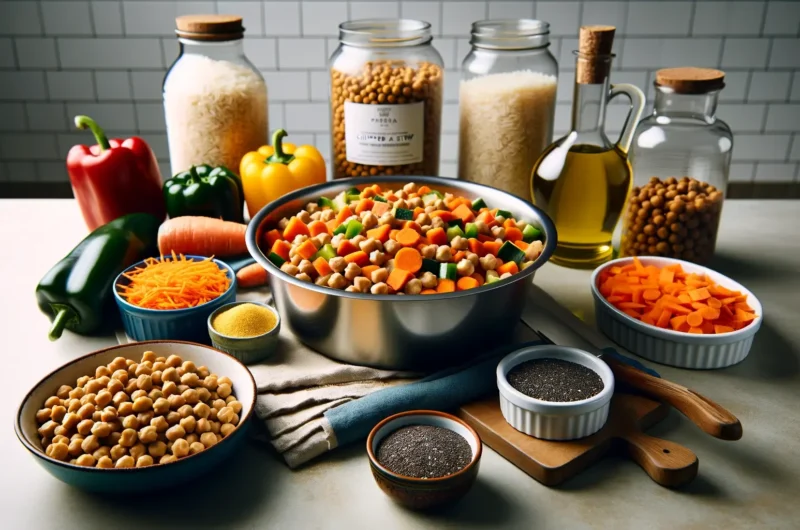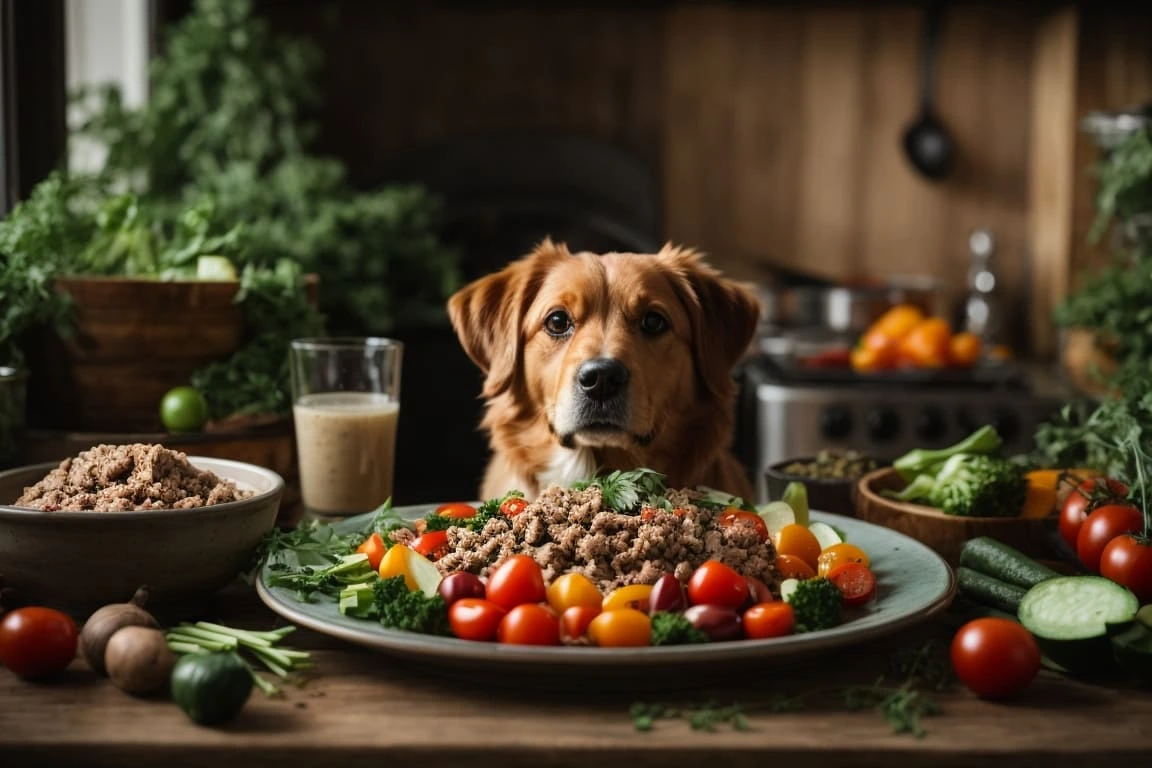A vegetarian twist: Homemade dog food recipes your pooch will love

Are you a dog owner who wants to incorporate more vegetarian meals into your furry friend’s diet? Look no further! Homemade vegetarian dog food is a great way to provide your pooch with a nutritious and delicious meal while also promoting a plant-based lifestyle. Many pet owners are turning to homemade dog food as a healthier alternative to store-bought options, and with the added bonus of being vegetarian, it’s a win-win situation. In this blog post, I will share some easy and tasty homemade vegetarian dog food recipes that your four-legged companion will love.
Why Consider Vegetarian Dog Food?
You might be wondering why someone would even consider feeding their pup a vegetarian diet. After all, don’t dogs naturally crave a juicy steak or a delicious chicken drumstick? Interestingly enough, our canine companions are actually omnivores, capable of receiving necessary nutrients from both plant and meat sources. This might come as a surprise, but it opens up a world of dietary possibilities!
But why turn to vegetarian dog food in the first place? There could be a myriad of reasons. For starters, you might be motivated by ethical considerations. The meat industry is fraught with issues related to animal welfare and environmental sustainability, and by choosing vegetarian dog food, you’re taking a stand against these problems.
Perhaps your dog is allergic to certain types of meat, causing them to itch, lose hair, or suffer from digestive issues. In this case, a vegetarian diet might alleviate these symptoms. Or maybe you simply want to introduce more variety into your dog’s meals, providing them with an exciting mix of flavors and textures.
Regardless of your reasons, it’s crucial to remember the importance of balance and diversity in your dog’s diet. Just as humans thrive on a varied diet, dogs also benefit from consuming a range of different foods. So, whether it’s ethical beliefs, health reasons, or a desire for variety driving your interest in vegetarian dog food, ensure your furry friend’s meals are well-rounded, offering all the essential nutrients they need to stay healthy and happy.
Health Benefits of Vegetarian Dog Food
Embracing a vegetarian lifestyle for your furry companion could unlock a host of health benefits. You might notice an improvement in your pooch’s skin and fur condition, with a shinier coat and fewer skin issues due to the lack of allergenic animal proteins. Additionally, a well-planned, plant-based diet may help keep your dog’s weight in check, reducing the risk of obesity – a common concern in many domestic dogs.
Digestive health could also see a boost with the introduction of more fiber-rich vegetables and whole grains, promoting regular bowel movements and healthier gut bacteria. Plus, the potential decrease in cholesterol and saturated fats commonly found in meat might contribute to a healthier heart for your canine buddy.
But it’s not just about the physical perks. By preparing your dog’s meals yourself, you have the power to control exactly what goes into their bowl. This means you can avoid the artificial preservatives, colorings, and mystery meat by-products that are often found in store-bought dog food. You have the opportunity to choose fresh, organic ingredients, and the peace of mind that comes with knowing you’re giving your dog the best possible nourishment.
Remember, however, that every dog is unique. What works wonders for one might not work for another. It’s crucial to monitor your dog’s health and happiness closely during this dietary transition, and adjust their meals as necessary to ensure they’re receiving all the right nutrients.
Whether it’s more wag in their tail, a gleam in their eyes, or the simple joy of seeing them lick their bowl clean, the health benefits of vegetarian dog food can be a rewarding experience for both you and your canine companion.
Making a Balanced Vegetarian Dog Food
Crafting a well-rounded vegetarian diet for your pup isn’t rocket science, but it does require a thoughtful approach. The key to success? Balance and diversity. Just as we humans thrive on a colorful plate of food, our dogs do too. That’s why it’s vital to include a variety of plant-based ingredients that provide all the necessary nutrients for our furry pals.
The big five that need to be incorporated into each meal are proteins, carbohydrates, fats, vitamins, and minerals. While proteins are typically associated with meats, there are plenty of plant-based proteins your pooch can gobble up. Foods like lentils, chickpeas, and quinoa are excellent sources of protein and can be a staple in your dog’s vegetarian meals.
Carbohydrates are vital for energy. Sweet potatoes, brown rice, and oats are packed with complex carbohydrates and dietary fiber that will keep your dog full and energized throughout the day. Essential fats, which maintain your dog’s skin and coat health, can be found in flaxseeds, chia seeds, and olive oil.
As for vitamins and minerals, these can be obtained from an assortment of fruits and vegetables. Leafy greens like spinach and kale are packed with iron and calcium. Carrots, bell peppers, and blueberries offer a wide range of vitamins like A, C, and E, as well as powerful antioxidants.
However, it’s worth noting that certain nutrients predominantly found in meat, such as Vitamin D3, Vitamin B12, and taurine, might be harder to get from a vegetarian diet. Therefore, you may need to consider supplementing these to ensure your dog isn’t missing out on these critical nutrients.
Remember, variety is the spice of life, and your dog’s meals should reflect this. Rotate ingredients to provide a mix of different nutrients and to keep things interesting for your pup. So go ahead, put on your apron, and start exploring the vibrant world of homemade vegetarian dog food. Your dog will thank you for it!
Homemade Vegetarian Dog Food Recipes
Chickpea Stew:
Course: Dog Recipes4-5
servings15
minutes30
minutes300-400
kcalTime to put on your chef hat and whip up some delicious homemade vegetarian meals your dog will go crazy for. Here are Chickpea Stew easy-to-follow recipes to get you started on your vegetarian dog food journey.
Ingredients
– 2 cups chickpeas, soaked overnight
– 1 cup chopped carrots
– 1 cup cooked brown rice
– 2 tablespoons olive oil
Directions
- 1. Cook the Chickpeas:
Drain and rinse 2 cups of overnight-soaked chickpeas.
Boil them in a pot of water until tender, about 1 hour.
Drain and set aside. - Prepare the Vegetables:
Chop 1 cup of carrots and 1 cup of bell peppers.
Sauté them in a pan with 2 tablespoons of olive oil until they soften. - Combine Ingredients:
In a large bowl, mix the cooked chickpeas with the sautéed vegetables.
Add 1 cup of cooked brown rice and 1/4 cup of chia seeds.
Stir everything together evenly. - Cool and Serve:
Allow the stew to cool down to room temperature.
Serve an appropriate portion to your dog based on their size and dietary needs.
Store the remaining stew in the fridge in an airtight container for up to 5 days.
Begin by boiling the chickpeas until they’re tender. In a separate pot, cook the carrots and bell peppers until they’re soft. Once done, mix all the ingredients in a large bowl until they’re well combined. Let it cool before serving it to your pup.
These meals are not just tasty, but they are also packed with the nutrients that your canine companion needs. The quinoa and lentils in the first recipe are excellent sources of protein, while the sweet potatoes provide a healthy dose of complex carbohydrates. The second recipe offers a blend of protein from chickpeas and a variety of vitamins from the vegetables.
Don’t forget to get creative! Feel free to swap out ingredients based on what you have on hand or what your dog prefers. You could try adding blueberries for an antioxidant boost or swap quinoa for oats for a change. The possibilities are endless! However, always remember to introduce new foods slowly to ensure your pup doesn’t have an adverse reaction.
With these recipe, your furry friend will be licking their bowl clean and wagging their tail for more. Enjoy this bonding experience of cooking for your dog. Happy meal prepping!
Ensuring Your Dog Enjoys the Food
Transitioning your dog to a new diet is an adventure that should be taken one step at a time. Like humans, dogs are creatures of habit, and any drastic changes to their diet can be unsettling for them. So, when you’re ready to introduce your homemade vegetarian dog food, it’s important to do so slowly and patiently.
Imagine someone switching your favorite meaty pizza with a vegetable-loaded one without any warning. You might turn your nose up at it initially, right? The same could happen with your dog. Start by introducing a small portion of the vegetarian meal mixed with your pup’s regular food. Each day, you can gradually increase the proportion of the vegetarian meal and decrease the old one.
This gradual shift serves two purposes. Firstly, it gives your dog’s digestive system a chance to adjust to the new food, helping to avoid any potential stomach upsets. Secondly, it allows your furry friend to become familiar with the new flavors and textures at their own pace. Just like we might need a little time to warm up to the idea of a vegetable pizza, your dog might need some time to get used to their new vegetarian meals.
As you go through this transition, pay close attention to your dog’s behavior around meal times. Are they showing excitement when it’s time to eat? Do they devour the food enthusiastically or approach it hesitantly? These signs can tell you a lot about how your dog feels about their new diet. You know your dog best, so trust your instincts. If they seem to love the food, that’s a great sign you’re on the right track.
In the end, the goal is to make mealtimes enjoyable for your pooch. You want them wagging their tail in anticipation of their meals, licking their bowl clean, and looking up at you with those love-filled eyes that say, “Thanks for the yummy food, human!” With patience, persistence, and lots of love, you’ll help your dog embrace their new vegetarian meals with gusto.
Conclusion
Embracing the world of homemade vegetarian dog food can be an exciting culinary adventure for both you and your furry friend. By making the switch, not only can you serve up delicious, tail-wagging meals, but you can also contribute to a more ethical, environmentally-friendly lifestyle. You can be confident in knowing exactly what’s in your pup’s bowl, using fresh and nutritious ingredients tailored specifically to their needs.
Don’t forget, though, every culinary master knows that balance is key to any diet, vegetarian or otherwise. Make sure your dog’s meals provide a diverse mix of nutrients to keep them healthy, vibrant, and full of energy. But remember, always consult your vet when making significant dietary changes. They can provide valuable guidance to ensure your dog’s diet is well-balanced and meets all their nutritional needs.
So, grab that apron and get ready to serve up some veggie delights that will have your canine companion wagging their tail in anticipation. By taking the time to prepare these meals, you’re not just feeding your dog; you’re providing them with love and care, one bowl at a time. Bon appétit, pooch!











